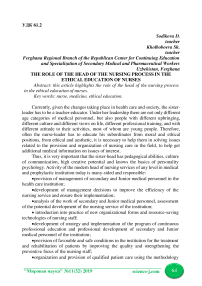The role of the head of the nursing process in the ethical education of nurses
Автор: Sodikova D., Kholboboeva Sh.
Журнал: Мировая наука @science-j
Рубрика: Основной раздел
Статья в выпуске: 11 (32), 2019 года.
Бесплатный доступ
This article highlights the role of the head of the nursing process in the ethical education of nurses.
Nurse, medicine, ethical education
Короткий адрес: https://sciup.org/140264075
IDR: 140264075 | УДК: 61.2
Текст научной статьи The role of the head of the nursing process in the ethical education of nurses
Currently, given the changes taking place in health care and society, the sisterleader has to be a teacher-educator. Under her leadership there are not only different age categories of medical personnel, but also people with different upbringing, different culture and different views on life, different professional training, and with different attitude to their activities, most of whom are young people. Therefore, often the nurse-leader has to educate his subordinates from moral and ethical positions, from ethical and aesthetic, it is necessary to help them in solving issues related to the provision and organization of nursing care in the field, to help get additional medical information on issues of interest.
Thus, it is very important that the sister-head has pedagogical abilities, culture of communication, high creative potential and knows the basics of personality psychology. Activity of the modern head of nursing services of any level in medical and prophylactic institution today is many-sided and responsible:
-
• provision of management of secondary and Junior medical personnel in the health care institution;
-
• development of management decisions to improve the efficiency of the nursing service and ensure their implementation;
-
• analysis of the work of secondary and Junior medical personnel, assessment of the potential development of the nursing service of the institution;
-
• introduction into practice of new organizational forms and resource-saving technologies of nursing staff;
-
• development of strategy and implementation of the program of continuous professional education and professional development of secondary and Junior medical personnel of the institution;
-
• provision of favorable and safe conditions in the institution for the treatment and rehabilitation of patients by improving the quality and strengthening the preventive focus of the nursing staff;
-
• organization and provision of qualified patient care using the methodology
of the nursing process, provision of first aid in emergency situations;
-
• implementation of social and psychological regulation in the workforce, promoting the creation of business, creative the role, functions and organizational forms of nursing staff are changing in accordance with the new challenges facing health care. The new health challenges include:
-
• development of primary health care aimed at disease prevention and health promotion, hygienic training and education of the population;
-
• restructuring of medical institutions, contributing to the optimization of terms of stay in the hospital;
-
• the expansion of care at home using new technologies of care and the nursing process;
-
• improvement of the system, forms and stages of rehabilitation measures;
-
• the formation of hospitals or departments of nursing;
Development of hospice system with palliative care for the dying, based on the unity of medical, social systems and spiritual institutions of society. As nurses provide a large amount of diagnostic, preventive and social care, the transformation of the health system began with changes in the system of their professional training.
In Uzbekistan, in 1995, at the first meeting of chief nurses with who representatives held in Tashkent, the development of the legal framework for nursing, the revision of the professional structures of middle-level personnel, the clarification of the role and function at each level of education reform were recognized as priorities. As a result of the nursing reform, a legislative framework for a multi-stage training system has been created. The analysis of the studied scientific and medical literature shows that today the most adequate to the organizational, managerial and administrative tasks of the development of nursing is the ethical and deontological approach, which allows to Supplement narrowly focused medical research with a wider social context and to identify latent factors, processes and phenomena, inhibiting its development.
Список литературы The role of the head of the nursing process in the ethical education of nurses
- Abdullaev A. A. Ethical, psychological and professional requirements to the nurse of General medical practice of family medicine. //Nurse. - M., 2006.- No. 1.
- Dvoynikov S. I., Karaseva L. A. Philosophical and moral-ethical aspects of nurse activity. // Medical care.- M., 1997. No. 3.
- Ekimova N. A. New technologies in the organization of work and management of secondary medical personnel. // Nursing. - M. 2011. No. 5.


